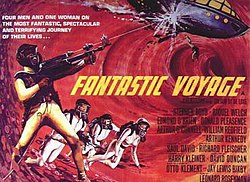Fantastic voyage
| Fantastic Voyage | |
|---|---|

|
|
| Directed by | Richard Fleischer |
| Produced by | Saul David |
| Written by |
Story: Jerome Bixby Otto Klement Screenplay: Harry Kleiner Adaptation: David Duncan |
| Starring |
Stephen Boyd Raquel Welch Edmond O'Brien Donald Pleasence |
| Music by | Leonard Rosenman |
| Cinematography | Ernest Laszlo |
| Edited by | William B. Murphy |
| Distributed by | 20th Century Fox |
|
Release date
|
|
|
Running time
|
100 minutes |
| Country | United States |
| Language | English |
| Budget | $5.1 million |
| Box office | $12 million |
| Author | Isaac Asimov |
|---|---|
| ISBN |
Fantastic Voyage is a 1966 American science fiction film directed by Richard Fleischer and written by Harry Kleiner, based on a story by Otto Klement and Jerome Bixby. The film is about a submarine crew who shrink to microscopic size and venture into the body of an injured scientist to repair the damage to his brain. The original story took place in the 19th century and was meant to be a Jules Verne–style adventure with a sense of wonder. Kleiner abandoned all but the concept of miniaturization and added a Cold War element. The film starred Stephen Boyd, Raquel Welch, Edmond O'Brien, and Donald Pleasence.
Bantam Books obtained the rights for a paperback novelization based on the screenplay and approached Isaac Asimov to write it. Because the novelization was released six months before the movie, many people mistakenly believed the film was based on Asimov's book.
The movie inspired an animated television series.
The United States and the Soviet Union have both developed technology that can miniaturize matter by shrinking individual atoms, but only for a limited amount of time, depending on how small the item is miniaturized.
The scientist Dr. Jan Benes (Jean Del Val), working behind the Iron Curtain, has figured out how to make the process work indefinitely. With the help of the CIA, he escapes to the West, but an attempted assassination leaves him comatose with a blood clot in his brain.
...
Wikipedia
